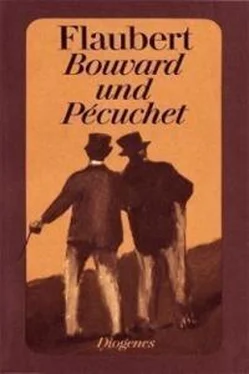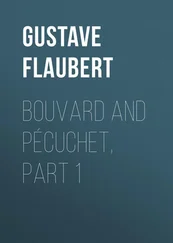The barometer deceived them; the thermometer taught them nothing; and they had recourse to the device invented in the time of Louis XIV. by a priest from Touraine. A leech in a glass bottle was to rise up in the event of rain, to stick to the bottom in settled weather, and to move about if a storm were threatening. But nearly always the atmosphere contradicted the leech. Three others were put in along with it. The entire four behaved differently.
After many reflections, Bouvard realised that he had made a mistake. His property required cultivation on a large scale, the concentrated system, and he risked all the disposable capital that he had left—thirty thousand francs.
Stimulated by Pécuchet, he began to rave about pasture. In the pit for composts were heaped up branches of trees, blood, guts, feathers—everything that he could find. He used Belgian cordial, Swiss wash, lye, red herrings, wrack, rags; sent for guano, tried to manufacture it himself; and, pushing his principles to the farthest point, he would not suffer even urine or other refuse to be lost. Into his farmyard were carried carcasses of animals, with which he manured his lands. Their cut–up carrion strewed the fields. Bouvard smiled in the midst of this stench. A pump fixed to a dung–cart spattered the liquid manure over the crops. To those who assumed an air of disgust, he used to say, "But 'tis gold! 'tis gold!" And he was sorry that he had not still more manures. Happy the land where natural grottoes are found full of the excrements of birds!
The colza was thin; the oats only middling; and the corn sold very badly on account of its smell. A curious circumstance was that La Butte, with the stones cleared away from it at last, yielded less than before.
He deemed it advisable to renew his material. He bought a Guillaume scarifier, a Valcourt weeder, an English drill–machine, and the great swing–plough of Mathieu de Dombasle, but the ploughboy disparaged it.
"Do you learn to use it!"
"Well, do you show me!"
He made an attempt to show, but blundered, and the peasants sneered. He could never make them obey the command of the bell. He was incessantly bawling after them, rushing from one place to another, taking down observations in a note–book, making appointments and forgetting all about them—and his head was boiling over with industrial speculations.
He got the notion into his head of cultivating the poppy for the purpose of getting opium from it, and above all the milk–vetch, which he intended to sell under the name of "family coffee."
Finally, in order to fatten his oxen the more quickly, he blooded them for an entire fortnight.
He killed none of his pigs, and gorged them with salted oats. The pigsty soon became too narrow. The animals obstructed the farmyard, broke down the fences, and went gnawing at everything.
In the hot weather twenty–five sheep began to get spoiled, and shortly afterwards died. The same week three bulls perished owing to Bouvard's blood–lettings.
In order to destroy the maggots, he thought of shutting up the fowls in a hencoop on rollers, which two men had to push along behind the plough—a thing which had only the effect of breaking the claws of the fowls.
He manufactured beer with germander–leaves, and gave it to the harvesters as cider. The children cried, the women moaned, and the men raged. They all threatened to go, and Bouvard gave way to them.
However, to convince them of the harmlessness of his beverage, he swallowed several bottles of it in their presence; then he got cramps, but concealed his pains under a playful exterior. He even got the mixture sent to his own residence. He drank some of it with Pécuchet in the evening, and both of them tried to persuade themselves that it was good. Besides, it was necessary not to let it go to waste. Bouvard's colic having got worse, Germaine went for the doctor.
He was a grave–looking man, with a round forehead, and he began by frightening his patient. He thought the gentleman's attack of cholerine must be connected with the beer which people were talking about in the country. He desired to know what it was composed of, and found fault with it in scientific terms with shruggings of the shoulders. Pécuchet, who had supplied the recipe for it, was mortified.
In spite of pernicious limings, stinted redressings, and unseasonable weedings, Bouvard had in front of him, in the following year, a splendid crop of wheat. He thought of drying it by fermentation, in the Dutch fashion, on the Clap–Meyer system: that is to say, he got it thrown down all of a heap and piled up in stacks, which would be overturned as soon as the damp escaped from them, and then exposed to the open air—after which Bouvard went off without the least uneasiness.
Next day, while they were at dinner, they heard under the beech trees the beating of a drum. Germaine ran out to know what was the matter, but the man was by this time some distance away. Almost at the same moment the church–bell rang violently.
Bouvard and Pécuchet felt alarmed, and, impatient to learn what had happened, they rushed bareheaded along the Chavignolles road.
An old woman passed them. She knew nothing about it. They stopped a little boy, who replied:
"I believe it's a fire!"
And the drum continued beating and the bell ringing more loudly than before. At length they reached the nearest houses in the village. The grocer, some yards away, exclaimed:
"The fire is at your place!"
Pécuchet stepped out in double–quick time; and he said to Bouvard, who trotted by his side with equal speed:
"One, two! one, two!"—counting his steps regularly, like the chasseurs of Vincennes.
The road which they took was a continuously uphill one; the sloping ground hid the horizon from their view. They reached a height close to La Butte, and at a single glance the disaster was revealed to them.
All the stacks, here and there, were flaming like volcanoes in the midst of the plain, stripped bare in the evening stillness. Around the biggest of them there were about three hundred persons, perhaps; and under the command of M. Foureau, the mayor, in a tricoloured scarf, youngsters, with poles and crooks, were dragging down the straw from the top in order to save the rest of it.
Bouvard, in his eagerness, was near knocking down Madame Bordin, who happened to be there. Then, seeing one of his servant–boys, he loaded him with insults for not having given him warning. The servant–boy, on the contrary, through excess of zeal, had at first rushed to the house, then to the church, next to where Monsieur himself was staying, and had returned by the other road.
Bouvard lost his head. His entire household gathered round him, all talking together, and he forbade them to knock down the stacks, begged of them to give him some help, called for water, and asked where were the firemen.
"We've got to get them first!" exclaimed the mayor.
"That's your fault!" replied Bouvard.
He flew into a passion, and made use of improper language, and everyone wondered at the patience of M. Foureau, who, all the same, was a surly individual, as might be seen from his big lips and bulldog jaw.
The heat of the stacks became so great that nobody could come close to them any longer. Under the devouring flames the straw writhed with a crackling sound, and the grains of corn lashed one's face as if they were buckshot. Then the stack fell in a huge burning pile to the ground, and a shower of sparks flew out of it, while fiery waves floated above the red mass, which presented in its alternations of colour parts rosy as vermilion and others like clotted blood. The night had come, the wind was swelling; from time to time, a flake of fire passed across the black sky.
Bouvard viewed the conflagration with tears in his eyes, which were veiled by his moist lids, and his whole face was swollen with grief. Madame Bordin, while playing with the fringes of her green shawl, called him "Poor Monsieur!" and tried to console him. Since nothing could be done, he ought to do himself justice.
Читать дальше








![Гюстав Флобер - Закат Карфагена [Сборник]](/books/414440/gyustav-flober-zakat-karfagena-sbornik-thumb.webp)


